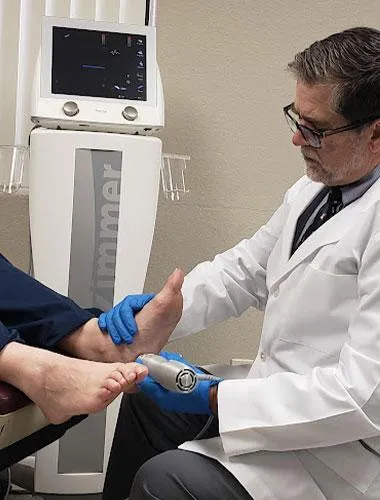Are You Looking For A Solution To Your Fungal Toenails In Marble Falls ?
Conveniently located just off Highway 281
281 North US HWY 281, Suite 201, Marble Falls, Texas 78654
Monday - Friday: 8am - 5pm
Free Parking Available


Download Your FREE Fungal Toenail Information Pack:
"Discover The Best Ways To Get Rid Of Your Fungal Toenails Forever"
👇 Click the button below to get your FREE Report 👇
Marble Falls Most Reviewed Podiatry Clinic
Marble Falls
Does any of this sound like YOU?
Do you find yourself being self-conscious, particularly in social situations where people may notice the affected nails?
Do you find it difficult to trim or maintain your nails properly, which results in discomfort?
Do you have brittle nails that are prone to breaking, which can be painful and interfere with your daily activities?
Do you have a foul smell from your affected nails that is starting to affect your confidence and social interactions?
Do you find yourself itching, scratching, or picking at the affected area?
Have you started to worry that you will never get rid of your fungal toenail and may never be able to resume the activities you love?
If you answered YES to any of the above, you may have found the ANSWER to your fungal nails questions at Dr Frank Henry, DPM - Marble Falls, Marble Falls

Got a Question?
Ask Dr Frank Henry, DPM - Marble Falls and his team of experts
Signs and Symptoms That May Suggest You Have a Fungal Nail Problem
As a podiatrist, I would like to provide you with some common signs and symptoms that may suggest you have a fungal nail problem. Please keep in mind that this information is for educational purposes only, and it is essential to consult a healthcare professional for a proper diagnosis and treatment plan. If you suspect you have a fungal nail infection, I recommend scheduling an appointment with a podiatrist for a thorough evaluation.
Here are some conditions that may indicate a fungal nail problem:
Discoloured Nails: One of the early signs of a fungal nail infection is a change in the colour of the affected nail. The nail may turn yellow, brown, green, or white.
Thickened Nails: Fungal nail infections can cause the affected nails to become thick and difficult to trim. They may also appear distorted in shape.
Brittle or Crumbly Nails: Infected nails can become brittle, easily break, or crumble at the edges.
Separation of Nail from the Nail Bed: The infected nail may lift or separate from the nail bed, causing pain and discomfort.
Buildup of Debris: Fungal nail infections can lead to the accumulation of debris under the nail, causing further discolouration.
Foul Odour: In some cases, fungal nail infections can produce a foul smell from the affected nail area.
Pain or Discomfort: As the infection progresses, you may experience pain, tenderness, or a sensation of pressure around the affected nail.
Spreading to Other Nails: Fungal nail infections can spread to adjacent nails, leading to multiple infected nails.
Difficulty in Applying Nail Polish: The presence of a fungal infection can make it challenging for nail polish to adhere to the affected nail surface.
Pre-existing Risk Factors: Individuals with a history of athlete's foot, excessive sweating (hyperhidrosis), diabetes, compromised immune systems, or those who frequently wear closed-toe shoes are at higher risk of developing fungal nail infections.

If you notice any of these signs and symptoms, I strongly advise seeking professional guidance from a podiatrist or healthcare provider. Early diagnosis and appropriate treatment can help prevent the infection from spreading and promote a faster recovery. Remember, self-diagnosis is not recommended, and a podiatrist can accurately assess your condition and recommend the most suitable treatment for your specific case.
Dr. Frank J Henry
Dr. Frank J Henry
Dr Frank Henry, DPM - Marble Falls
Have Questions? Request a Callback and Speak With Our Expert Team of Podiatrists

Fill in the form to request a Call From Our Team
One of our team members will call you for FREE and answer any questions or concerns you may have about your condition.
What Causes Fungal Toenails?
Fungal toenail infections, also known as onychomycosis, are a common podiatric condition caused by various types of fungi. The infection affects the toenails, leading to discoloration, thickening, and sometimes pain or discomfort. Understanding the causes of fungal toenails is crucial in preventing and managing this bothersome condition. As a podiatrist, I aim to shed light on the contributing factors that can lead to fungal toenail infections, enabling patients to take proactive measures to protect their foot health.
Causes of Fungal Toenails:
Dermatophyte Fungi: The most common cause of fungal toenail infections is dermatophyte fungi. These organisms thrive in warm, moist environments, such as public swimming pools, locker rooms, and showers.
Yeast and Mold: Other types of fungi, such as yeast and mold, can also lead to toenail infections. These fungi are more opportunistic and may affect individuals with weakened immune systems or compromised nail barriers.
Athlete's Foot (Tinea Pedis): Fungal toenail infections can develop from untreated athlete's foot (tinea pedis), a fungal infection that primarily affects the skin between the toes and the soles of the feet.
Trauma or Injury: Nails that have been injured, bruised, or damaged are more susceptible to fungal infections. The trauma creates an entry point for the fungus to invade the nail bed.
Tight-Fitting Shoes: Wearing tight or ill-fitting shoes can lead to excessive sweating and create a warm, damp environment conducive to fungal growth.
Nail Abnormalities: Structural abnormalities in the nails, such as psoriasis or nail dystrophy, can weaken the nail's integrity, making it easier for fungi to penetrate and cause an infection.
Poor Foot Hygiene: Inadequate foot hygiene, including not drying the feet thoroughly after bathing, can create an environment that encourages fungal growth.
Shared Footwear or Nail Tools: Sharing shoes, socks, or nail grooming tools with someone who has a fungal nail infection can lead to cross-contamination.
Poor Circulation: Individuals with poor circulation, often seen in conditions like diabetes, are at higher risk of developing fungal toenail infections due to compromised immune responses.
Ageing: As we age, our nails become more brittle and prone to microscopic cracks, providing an entry point for fungi to invade.
Immune System Weakness: A weakened immune system due to certain medical conditions or medications can make the body less capable of fighting off fungal infections.
Environmental Factors: Living in warm and humid climates can increase the likelihood of fungal growth and infection.

Download Your FREE Fungal Toenail Information Pack:
"Discover The Best Ways To Get Rid Of Your Fungal Toenail Forever"
👇 Click the button below to get your FREE Report 👇
Tired of Living With Fungal Toenails? We Can Help

Fill in the form to request a Call From Our Team
One of our team members will call you for FREE and answer any questions or concerns you may have about your fungal toenail condition.
Is The Fungal Toenail Programme at Dr Frank Henry, DPM - Marble Falls Right for You?
Our team of podiatrists at Dr Frank Henry, DPM - Marble Falls are experts in treating fungal nails, helping 1000's of patients get back their confidence.
Here are just a few of the things our Podiatry Team can do for you:
We can help quickly relieve your fungal nail symptoms, often within just a couple of sessions.
On day one, we can inform you of what you have, why you have it, and how to get rid of it, so you can feel confident and informed about your treatment.
We can help you discover what's truly causing your fungal nail infection and address the root issue in as little as 20 minutes.
Our treatments can help give you more energy to enjoy each day to the fullest.
We can help you say goodbye to taking harmful painkillers long-term and find a more effective solution.
Our treatments can help you avoid surgery and painful injections.
We want to help you reclaim the quality time with family and friends that fungal toenail infections may have taken away.
We can help you skip the doctor's waiting room and avoid repeated visits to get more prescriptions.
Our goal is to help you stay active and enjoy a fulfilling life, free from the curse of fungal toenail infections.
Is Your Fungal Nail Slowing You Down? Take Us Up On One Of Our FREE Options
Option #1 (👍 most popular)

Option #2


6 Reasons To Choose Dr. Frank Henry's Office in Marble Falls
Dr. Frank Henry is a Board Certified Podiatrist: Dr Frank Henry in Marble Falls boasts a highly qualified and experienced team who are dedicated to providing top-notch foot and ankle care. Their expertise ensures that patients receive accurate diagnoses and personalized treatment plans tailored to their specific needs.
Comprehensive range of services: Whether it's treating common foot conditions like bunions, ingrown toenails, or plantar fasciitis, or addressing more complex issues such as sports injuries or diabetic foot care. Our office offers a comprehensive range of services. Patients can trust that all their foot and ankle concerns will be addressed under one roof.
State-of-the-art facilities and technology: Dr. Frank Henry is committed to staying at the forefront of podiatry care by investing in state-of-the-art facilities and the latest technology. This allows for more accurate assessments, advanced treatment options, and enhanced patient outcomes.
Patient-centered approach: Patients are the top priority with Dr. Frank Henry . The team believes in a patient-centered approach, where they listen attentively to the concerns and goals of each individual. This ensures that the treatment plan aligns with the patient's lifestyle and preferences, leading to better compliance and results.
Holistic and preventive care: Beyond just treating existing conditions, Dr. Henry emphasizes the importance of holistic and preventive care. He educates patients on proper foot care techniques and lifestyle adjustments to minimize the risk of future foot problems, promoting long-term foot health and overall well-being.
Positive patient reviews and testimonials: The reputation of Dr. Henry speaks for itself through the positive feedback and testimonials from satisfied patients. Many individuals have shared their success stories and experiences, highlighting the clinic's commitment to excellence and patient satisfaction.
Frequently Asked Questions About Fungal Nails
What causes fungal toenails?
Fungal toenails, also known as onychomycosis, are primarily caused by various types of fungi, such as dermatophytes, yeasts, and molds. These organisms thrive in warm and moist environments, making toenails susceptible to infection, especially in conditions like sweaty shoes or damp communal areas.
How can I prevent fungal toenail infections?
To prevent fungal toenail infections, practice good foot hygiene. Keep your feet clean and dry, trim your toenails regularly, wear breathable shoes, and change socks frequently. Avoid walking barefoot in public places like locker rooms and pool areas, and be cautious when getting pedicures to ensure that tools are properly sanitized.
What are the symptoms of fungal toenails?
Common symptoms of fungal toenails include discoloration (yellowing or darkening of the nail), thickening, brittleness, distorted shape, and a foul odor. In some cases, the infected nail may separate from the nail bed, leading to pain or discomfort.
How is a fungal toenail infection diagnosed?
Diagnosis often involves a visual examination by a healthcare professional. Additionally, they may take a nail clipping or sample to perform laboratory tests like a fungal culture or microscopy to identify the specific fungus causing the infection.
What are the treatment options for fungal toenails?
Treatment options vary, and they may include antifungal medications (oral or topical), medicated nail polish, or in severe cases, surgical removal of the nail. It's important to consult with a healthcare professional to determine the most appropriate treatment based on the severity of the infection.
How long does it take to cure a fungal toenail infection?
The duration of treatment varies depending on the severity of the infection and the chosen treatment method. It may take several weeks to several months for the new, healthy nail to replace the infected portion. Consistent and diligent adherence to the prescribed treatment is crucial for successful resolution.
Can over-the-counter antifungal products treat fungal toenails effectively?
While some over-the-counter antifungal products may provide relief for mild cases, consulting a healthcare professional for proper diagnosis and prescription-strength medications is advisable for more severe infections. Over-the-counter options may not be potent enough for effective treatment in some cases.
Are fungal toenail infections contagious?
Yes, fungal toenail infections can be contagious. Avoid sharing personal items such as nail clippers and socks, and practice good hygiene to reduce the risk of spreading the infection to others or other areas of your own body.
Can I wear nail polish if I have a fungal toenail infection?
It's generally recommended to avoid nail polish during the treatment of a fungal toenail infection, as it may trap moisture and exacerbate the condition. Keeping the nails clean and allowing them to breathe is crucial for effective treatment.
What should I do if home remedies don't improve my fungal toenails?
If home remedies prove ineffective, or if the infection worsens, consult a healthcare professional. They can provide a proper diagnosis and recommend appropriate prescription medications or other advanced treatment options. Early intervention increases the likelihood of successful treatment.
Please note that these FAQs provide general information and should not replace personalized advice from a qualified healthcare professional. It is important to consult with a trusted podiatrist to assess your individual case and determine the most suitable treatment plan for your fungal nails.
Have Questions? Request a Call Back and Speak With Our Team

Fill in the form to request a Call From Our Team
One of our team members will call you for FREE and answer any questions or concerns you may have about your aches and pains.



